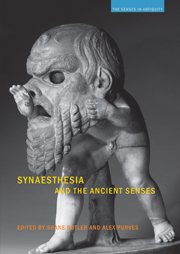Book contents
- Frontmatter
- Contents
- Contributors
- Introduction: synaesthesia and the ancient senses
- 1 Why are there nine Muses?
- 2 Haptic Herodotus
- 3 The understanding ear: synaesthesia, paraesthesia and talking animals
- 4 Aristophanes, Cratinus and the smell of comedy
- 5 “Looking mustard”: Greek popular epistemology and the meaning of δριμύς
- 6 Plato, beauty and “philosophical synaesthesia”
- 7 Manilius' cosmos of the senses
- 8 Reading death and the senses in Lucan and Lucretius
- 9 Colour as synaesthetic experience in antiquity
- 10 Blinded by th light: oratorical clarity and poetic obscurity in Quintilian
- 11 The sense of a poem: Ovids Banquet of Sence (1595)
- 12 Saussure's anaphonie: sounds asunder
- 13 Beyond Narcissus
- Bibliography
- Index
8 - Reading death and the senses in Lucan and Lucretius
- Frontmatter
- Contents
- Contributors
- Introduction: synaesthesia and the ancient senses
- 1 Why are there nine Muses?
- 2 Haptic Herodotus
- 3 The understanding ear: synaesthesia, paraesthesia and talking animals
- 4 Aristophanes, Cratinus and the smell of comedy
- 5 “Looking mustard”: Greek popular epistemology and the meaning of δριμύς
- 6 Plato, beauty and “philosophical synaesthesia”
- 7 Manilius' cosmos of the senses
- 8 Reading death and the senses in Lucan and Lucretius
- 9 Colour as synaesthetic experience in antiquity
- 10 Blinded by th light: oratorical clarity and poetic obscurity in Quintilian
- 11 The sense of a poem: Ovids Banquet of Sence (1595)
- 12 Saussure's anaphonie: sounds asunder
- 13 Beyond Narcissus
- Bibliography
- Index
Summary
The dead man has poetry in his stomach, bowels and genitals.
In the dead man's inner organs, poems are born, mate, change and die.
(Marvin Bell, The Book of the Dead Man, 1994: #10)People have been dying since long before we were even really people, yet none of us knows how it feels to die, or what death ultimately means for our senses. Does it erase them? Or do they live on? And if the latter, at what intensity and for how long? In general, modern science says that death is the end: on dying our senses are snuffed out, and in a surprisingly consistent order. But what happens to us after we die is an intensely personal question, and many of us – a shocking majority it seems – do not believe what our science has to say. Instead, by some twist of fate death's blank silences make poets of us all. And for those who were already poets, its impulses, we are assured, sing with violent metapoetic possibility. For the Roman poets Lucan and Lucretius, death, poetry and the senses are intimately – and inextricably – connected. Exactly how, and what this means for our own experiences of their texts are the questions that frame the rest of this inquiry.
We start with a particularly violent episode. In 82bce the city of Rome was filled with death and terror as a result of Sulla’s proscriptions. According at least to the most vivid accounts of the period, dead bodies were everywhere, piled headless in the Forum and in the streets, choking the sewers and the flow of the Tiber. Sulla had put a price on the lives of his enemies and as a result, not just in Rome, but throughout all Italy, violence reigned supreme as heads were hacked off and sent back to the capital to be put on display. For those who lived through the nightmare, mere mention of this blood-stained chapter of Rome’s history was enough to evoke a shudder of horror. But its countless atrocities also proved inescapably alluring for survivors and later generations alike, and its brutalities were constantly revisited in the subsequent pages of Latin literature. Among the many murders of this period, however, one stands out as especially violent and favoured in our sources: the horrific end of Marius Gratidianus.
- Type
- Chapter
- Information
- Synaesthesia and the Ancient Senses , pp. 115 - 126Publisher: Acumen PublishingPrint publication year: 2013



